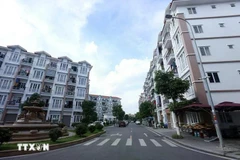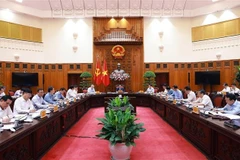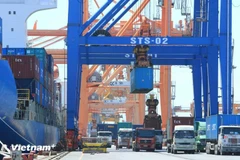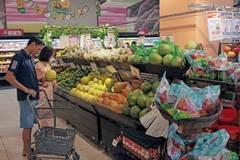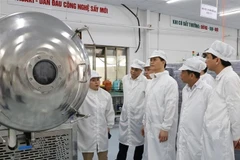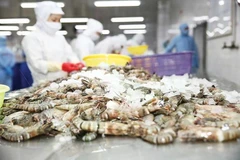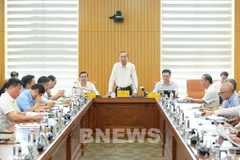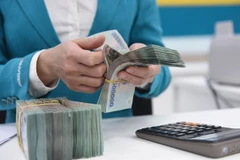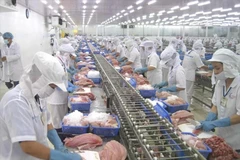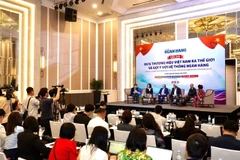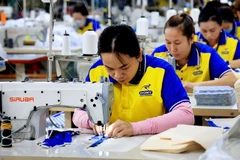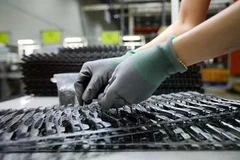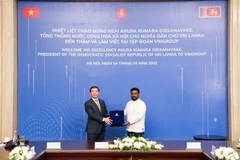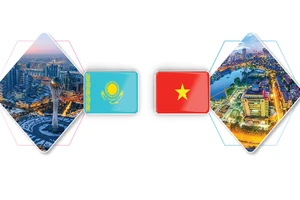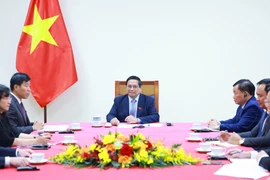A representative of Tuyen Quang Sugar Joint StockCompany said at a seminar in Hanoi last week that sugar refining firmswould have to rely on biomass power generation as a new source of incomesince sugar prices would steadily drop in the future.
Forty-foursugar refineries in the country will have to invest in biomass powerplants as an irreversible business trend if they are to survive, therepresentative told the seminar, co-organised by the German Agency forInternational Cooperation (GIZ) and the General Department of Energy ofthe Ministry of Industry and Trade.
“International competition inthe sugar sector will be intense from next year, so sugar firms cannotdepend on sugar as a single source of income,” he said. Sugar producerswill have to switch to in-depth investment by using cane bagasse as afuel to generate power.
“We are willing to build power plants of5MW to 30MW each. There are 12 to 14 investors considering thepossibility of getting involved in those projects. However, we needinvestment guidelines for this sector; otherwise, we don’t know where wecan start,” he was quoted by the Daily as saying.
He said he hadasked Tuyen Quang authorities for advice on how to implement a biomasspower project but they had given an unsatisfactory answer and asked himto hire a consulting firm. Therefore, he has put the plan on hold.
Inthe past, there were some bagasse-fueled power plants selling toVietnam Electricity Group (EVN) for as low as four cents per kWh.However, the price has now risen to 5.3 cents and EVN is required to buybiomass power in line with the Government’s Decision 24 issued thisyear.
Sharing his view, Pham Quang Vinh, Deputy General Directorof Can Tho Sugar Joint Stock Company, said the remaining issue is thelack of a clear mechanism.
His company has sufficient funding todevelop a 30MW bagasse-fueled power plant at a cost of 1 million USD foreach megawatt, a little bit lower than the wind power development cost,he said.
However, power pricing negotiations with EVN haveproven to be tough, he said, and there are no policies supporting theimport of equipment for environmentally friendly power generation andfacilitating the cooperation between power transmission firms and powerplant investors.
He said if things went as planned, his firm’s bagasse-fired power project would be up and running in September 2017.
Biomasspower is one of seven kinds of renewable energy that can be developedin Vietnam. Among them are small-scale hydropower plants (less than 30MWeach), which now number 300 projects.
But the massivedevelopment of small and medium hydropower projects has caused negativeconsequences, leading to the removal of many projects. By last June, 415small hydropower projects had been cancelled.
Vietnam has seen anumber of wind power projects getting underway in the past few years.This is an area with high growth potential as Vietnam has a 3,200-kmcoastline, as well as many islands and highlands.
The country hasabout 67 wind power projects registered with capacity of six to 150 MWeach. However, most of them have remained in the preparatory stage orhave been suspended due to a lack of mechanisms and large investment.
VietnamRenewable Energy Joint Stock Company’s 30MW project in Binh Thuanprovince and Cong Ly Joint Stock Company’s 20MW project in Bac Lieuprovince are the only two wind power facilities connected to thenational grid.
Nonetheless, no biomass power projects have been licensed or listed in the national electricity development plan.
NguyenDuc Cuong, Director of the Centre for Renewable Energy and CleanDevelopment Mechanism under the Institute of Energy, said the potentialof biomass in Vietnam is estimated at 150 million tonnes a year,equivalent to 50 million tonnes of crude oil. In addition to bagasse andrice husk, all kinds of fiber and waste from agricultural and forestryactivities after harvest could be used as fuels for electricitygeneration.-VNA
